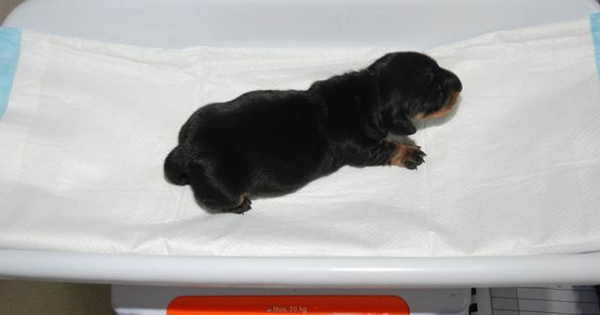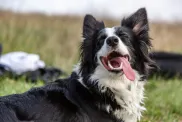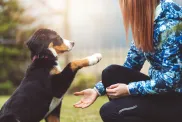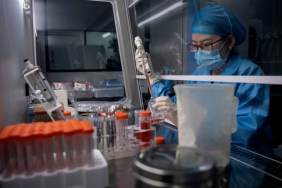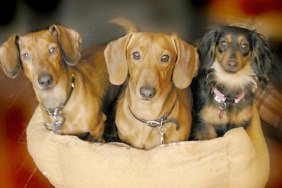It sounds a bit like science fiction, but scientists in South Korea have cloned an elderly Dachshund from Great Britain after her owner won a contest, the Daily Mail reports.
West London resident Rebecca Smith put forth £60,000 (more than $100,000 USD) to have her 12-year-old Dachshund, Winnie, cloned.
“We Brits do have a close attachment to our dogs, so it is exciting,” Smith tells Mirror. “My sausage dog is very special but she is 12 and not going to be around forever.”
Winnie isn’t just any dog, Smith says. She credits the little Doxie with helping her in her fight against bulimia, which Smith struggled with for a decade.
“I have come out the other end now and it has made me a stronger person and I think that Winnie has helped me through,” Smith says of her beloved dog.
“My boyfriend always joked, ‘We need to get her cloned,’” she adds.
Then, after years of joking around about the idea, Smith stumbled upon an article advertising a competition where the winner could have their precious pooch cloned, its duplicate grown in a laboratory halfway around the world. Smith was sold.
“We sent in some videos and it just sort of snowballed from there,” Smith says of the unusual contest. Contestants were asked to send in videos to make compelling cases as to why their dogs should be cloned.
Smith would eventually win the competition, which was organized by the South Korean biotechnology firm Sooam Biotech — the same company responsible for cloning U.S. couple Edgar and Nina Otto’s yellow Labrador Retriever, Sir Lancelot. They are also behind the world’s very first cloned dog, Afghan Hound Snuppy.
Scientists took a small sample of Winnie’s skin tissue and stored it in liquid nitrogen to preserve it during the trip from London to South Korea. From there, Winnie’s unique cells were injected into eggs from a donor Doxie at the science lab.
Like a page right out of Frankenstein, scientists then sent a spark of electricity through the specimen, resulting in a perfectly cloned embryo.
From the test tube, Winnie’s genetic duplicate was transferred into a surrogate mama dog, where the embryo continued to develop until it was fully-grown roughly 60 days later. A very proud and excited Smith traveled to the Sooam headquarters in Seoul for 1-pound “Mini Winnie’s” caesarean birth on March 30.
“I saw it being born and it looks exactly like Winnie,” Smith gushes. “It is identical.”
But whether Winnie’s expensive double will act just like Winnie still remains to be seen.
“Personality-wise I couldn’t tell you because it doesn’t see and it doesn’t hear yet — it is just a little sausage dog that wriggles around drinking milk,” says Smith.
Because of Britain’s strict quarantine laws, “Mini Winnie” will not get to come home for another six months. Smith says she is heartbroken.
“I am going to write [Prime Minister] David Cameron to see if he can make an exception for ‘Mini Winnie,” she says. “It was so hard leaving her behind, she is so sweet.”
Staff at Sooam say they will be sure to keep Smith updated as “Mini Winnie” grows and matures.
Smith might be thrilled to bring home her cloned canine, but the procedure is not without controversy. Cloning expert John Woestendiek believes the dog cloning industry is centered in South Korea because the country has very minimal ethical standards when it comes to the treatment of dogs. Woestendiek claims that the laboratory dogs used during the cloning procedure are sometimes killed for their meat and eaten afterwards.
Even one of the scientists responsible for the successful cloning of sheep Dolly in 1996 has is doubts about cloning companion animals.
“Owners will be disappointed,” says Sir Ian Wilmut. “So much of the personality of a dog comes from the way you treat them. If you spend £60,000 on a cloned dog you will treat it differently.”
But Rebecca Smith begs to differ, calling cloning a scientific development akin to IVF treatments and organ transplants. And as for the treatment of the dogs used in producing “Mini Winnie,” Smith says she knows they are living it up.
“I have seen on pet forums that some people are against it,” she says. “But the facility where the cloning takes place makes sure the animals are treated well.”
“It’s a lovely environment,” she adds, describing the center as “posh.”
Sources: Daily Mail, Mirror
